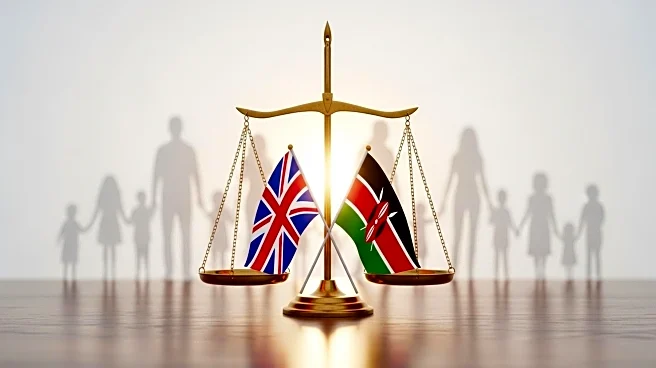What's Happening?
Seven individuals from Kenya have successfully proven in the Family Court in London that they were fathered by British men stationed at an army base in Kenya. The case utilized commercially available DNA databases to identify the fathers, six of whom served at the British Army Training Unit in Kenya (Batuk), while one was a contractor. This landmark decision marks the first instance of paternity being established in this manner in a UK court, potentially allowing the claimants to apply for British citizenship. The legal representation was provided by British lawyer James Netto, alongside geneticist Denise Syndercombe Court, who collected DNA samples and testimonies from the Nanyuki region of Kenya. The claimants, including Peter Wambugu, faced challenges growing up due to their mixed-race heritage and the absence of their fathers, but the court's decision has brought them a sense of closure and joy.
Why It's Important?
The court's ruling is significant as it sets a precedent for using DNA databases to establish paternity in legal cases, potentially impacting future claims involving military personnel stationed abroad. This decision not only provides personal closure for the individuals involved but also opens the door for them to seek British citizenship, which could alter their legal status and opportunities. The case highlights the broader implications of military deployments and the personal relationships formed during such assignments, raising questions about the responsibilities of military personnel and the rights of their offspring. It also underscores the role of genetic technology in resolving complex legal and familial issues.
What's Next?
Following the court's decision, the claimants may pursue applications for British citizenship, which could involve further legal processes and documentation. The ruling may prompt other individuals in similar situations to come forward, potentially leading to more cases that utilize DNA evidence to establish paternity. The British Army and legal entities may need to address the implications of this case, possibly reviewing policies related to personnel stationed abroad and their interactions with local communities. Additionally, the use of DNA databases in legal contexts may become more prevalent, prompting discussions on privacy and ethical considerations.
Beyond the Headlines
This case highlights the ethical and legal dimensions of using DNA technology in paternity cases, raising questions about privacy and consent. The decision may influence how military organizations address the personal relationships of their personnel and the potential legal obligations that arise. It also reflects broader societal issues related to race and identity, as the claimants faced discrimination due to their mixed heritage. The case may encourage discussions on the responsibilities of nations in addressing the consequences of their military presence abroad, including the rights and recognition of children born from such interactions.










